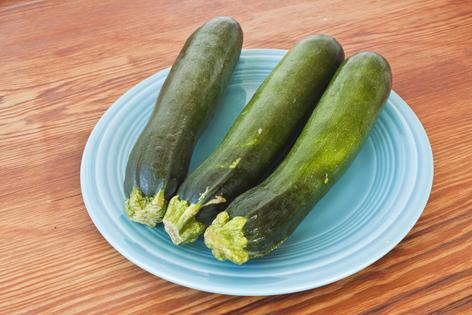Environmental Nutrition: Gad-zukes!
A homegrown favorite, zucchini is pleasantly prolific in home gardens.
The folklore
Fortunately, zucchini's versatility -- it's as tasty in savory sautéed, grilled, stuffed or "zoodled" recipes as in baked goods -- keeps step with high yields. Commonly known as Italian squash in the U.S., it's also known as zucchini (Italian for small squash) in Italy, and courgette in France. Zucchini originated in the Americas more than 7,000 years ago, native to Mexico and South America. Though cultivated in Italy in the 19th century, zukes didn't appear in North America until the 1920s! Already a culinary favorite, this gem brings a long list of nutrition accolades to the table.
The facts
Zucchini (Cucurbita pepo) is a summer squash, part of the Cucurbitaceae family (also known as the "cucurbits"), along with winter squash, melons, and cucumbers. They often have solid dark green skins, but may also be light green or yellow, and striped or even speckled. Zucchini are long and cylindrical, with a stem at the flower end. Varieties include Black Beauty, Raven, and Gourmet Gold. A one-cup serving of zucchini serves up 32 percent DV (Daily Value, based on 2,000 calories/day) of antioxidant vitamin C and a host of antioxidant carotenoids, including lutein, zeaxanthin, and beta-carotene.
The findings
Due to its carotenoid content -- notably lutein, beta-carotene, zeaxanthin and dehydroascorbic acid -- zucchini could play a positive role in health and nutrition for its ability to inhibit the damage and growth of cancer tumor cells (Nutrients, 2017). In addition, zucchini's anti-inflammatory and antioxidant activity has been shown to improve symptoms and quality of life in the management of patients affected by lower urinary tract symptoms and enlargement of the prostate gland (Activio Italiano di Urologia, Andrologia, 2016).
The finer points
Though available year round, zucchini's peak season is June through late August. They should be heavy for their size, with shiny, nick-free skins. Average sized zukes -- six to eight inches -- have the best flavor and texture. Store unwashed in an airtight refrigerated container up to a week. Zucchini are always a favorite in a veg saute with onions and peppers, or simply steamed and served with garden-fresh basil, chives or thyme. As outdoor temperatures rise, enjoy zucchini raw with a favorite dip, grated onto salads and sandwiches or as the star in gazpacho!
...continued







